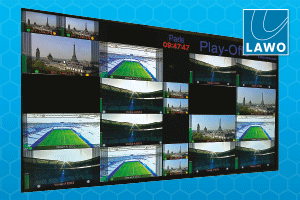It?s been reported that Etisalat is bringing 3DTV to the UAE making it only the fifth country in the world to have launched a service so far. And a recent survey predicts 64 million 3D televisions will be sold globally by 2018. Exciting news for the broadcasting industry? Or a costly distraction?

It’s been reported that Etisalat is bringing 3DTV to the UAE making it only the fifth country in the world to have launched a service so far. And a recent survey predicts 64 million 3D televisions will be sold globally by 2018. Exciting news for the broadcasting industry? Or a costly distraction?
I watch these technological developments with amusement. Most countries in the world do not have sufficient HD content, never mind 3D content, to fill the airtime on terrestrial or satellite TV channels. There are millions of ‘HD ready’ TV sets out there and most people still can’t access the services. As for 3D, one movie does not a revolution make.
But, is there a different revolution underway? And are the broadcasters largely ignoring it in the race for greater picture quality?
Wherever you look on the global television landscape in the free world, the programmes that are becoming hugely popular are those that are based on viewer participation; American Idol, the UK’s award-winning Britain’s Got Talent and Millions’ Poet in the Middle East.
Audiences for dramas, news broadcasts and documentaries are falling. The most popular serial dramas are no longer ‘appointment-to-view’ experiences, and are instead being watched by increasing numbers of fans online as downloads or via HDD recorders or Video on Demand (VOD) platforms like the BBC’s iPlayer. Documentary is finding a new home in cinema and news is becoming a subject mainly for specialised channels.
The one area that television broadcasters can still rely on for high ratings is the live event, usually sports, like the FIFA World Cup, but it won’t be long before anyone can live stream with a mobile phone.
Broadcasting has to change. The word means to ‘transmit, to disseminate, to spread widely’ and that model has to be killed because the new generation of viewers no longer wants to be passive receivers of content. The challenge for the television industry is how to share the broadcasting space.
Traditionally, broadcasters have denied access on the grounds of ‘quality’ but this cannot continue. The lesson from the internet is that consumers are more concerned with content quality than technical quality and if the industry doesn’t grasp this fact, television could wander off into a decade of naval-gazing while a new generation of producers head straight for the net.
You only have to watch YouTube for a few minutes to see the incredible array of content being generated by the consumer. Very little of it is HD or 3D but it is usually fresh and inventive. And to the new generation of viewers, there is no distinction between professional and amateur content. It’s just good or bad.
I would like to see broadcasters spending money on technical innovation that encourages more interaction. Google TV, due out later this year, is an exciting foray into this market bringing the ‘surfing’ experience directly to your television screen. Others need to follow and take it further; the next stage has to be the ability to ‘upload’ content into television shows.
Imagine news programmes in which viewers send instant video ‘vox pops’ via televisions equipped with webcams. Imagine talent shows in which voting is instantaneous (and continuous) through remote control buttons rather than SMS or calls. Imagine television debates where viewers participate with studio guests.
In the recent British elections, there were three live political debates on television and some commentators hailed this as a triumph of the traditional media over the digital. But they missed the point. The leaders’ debates were remarkable for the huge amount of complementary traffic on Twitter, IM platforms and Facebook. The viewers, excluded from the conversation by the broadcasters, decided to have one of their own.
The broadcasters need to find a way to bring these people into the fold. They have to find a way technically, and more importantly, culturally, to accept that the days of talking at the masses are over.
This is the future of television. It’s time to share.
Eric MacInnes is a TV veteran and currently the Thomson Foundation’s Faculty Head at twofour54 tadreeb.












































































